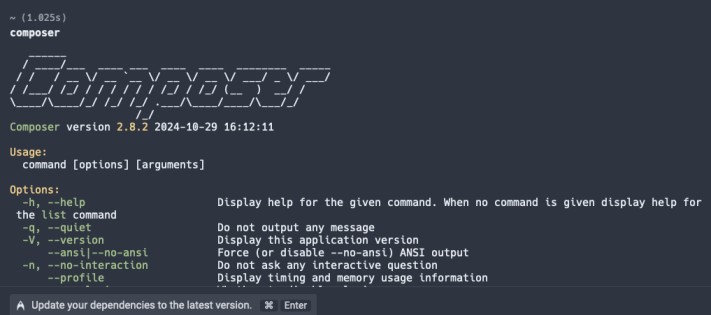Laravel is a free, open-source PHP framework that is powerful, easy to adapt, and incredibly useful for web development. It follows a design pattern called Model-View-Controller (MVC), which helps in organising code efficiently. Laravel reuses components from other popular frameworks, making building structured and scalable web applications quicker and easier. Laravel brings the best features from frameworks like CodeIgniter, Yii, and even Ruby on Rails, making it an ideal choice for developers.
If you already know PHP, especially Core and Advanced PHP, Laravel will help you work faster and more securely.
Advantages of Laravel
- Laravel makes it easy to build scalable web applications which can grow as per need.
- By reusing components from other frameworks, Laravel helps to speed up the development process.
- It uses namespaces and interfaces to help keep the code neat, organized, and easy to manage.
Composer
Composer is a tool that handles all the dependencies and libraries you need for your Laravel project. It is easy to install third-party libraries and keep everything up to date. The details of the dependencies are stored in a file called composer. jon. If you properly install composer in your system., open your cmd or Terminal and type this command.
composer -v
Which show the some version of the composer and details options show taht means your composer is install successfully. In next part we will cover how to install composer of your pc or laptop, for mac windows and linux os.

Artisan
Artisan is Laravel’s command-line interface (CLI). It provides helpful commands for building the application more efficiently. Artisan is built on top of the similar framework, so it includes some great features to help with the development. make sure use command in the directory where you auctualy install the Laravel application, or the command would not work. So first create the laravel project then cd into the folder after that run the command.
php artisan -v

Laravel Features
Laravel comes with several powerful features making a great option for web development:
- Modularity: Laravel includes over 20 built-in libraries and modules that enhance the application,by making updates easier.
- Testability: Laravel includes tools that allow you to test your code with ease and makes it simpler by maintaining your code, which ensures your requirements.
- Routing: Laravel gives you flexibility in defining routes for your web application, making it easier to scale and improve performance.
- Configuration Management: Laravel helps to manage the configuration of the application, especially when it’s running in different environments (e.g., development, production).
- Query Builder and ORM: Laravel comes with a powerful query builder which allows to interact with databases using simple methods. Including an Object-Relational Mapping (ORM)
- Schema Builder: The Schema Builder helps to define and maintain database structures directly in PHP code, and tracks changes to the database schema through migrations.
- Template Engine: Laravel uses Blade, a simple yet powerful template engine to create dynamic layouts that allows us to build reusable and organized views in a easy way.
- E-mail: Laravel has built-in support for sending emails, including the ability to send rich content and attachments effectively.
- Authentication: Laravel maintain the user authenticity by providing built-in features for registering users, resetting passwords, and managing user sessions.
- Redis: Laravel makes in use the Redis for cache and managing sessions, making it easily to scale your application and improve performance.
- Queues: Laravel offers queue services that allow to handle tasks like sending bulk emails or scheduling background jobs enable tasks to be processed in the background without slowing down the previous work.
